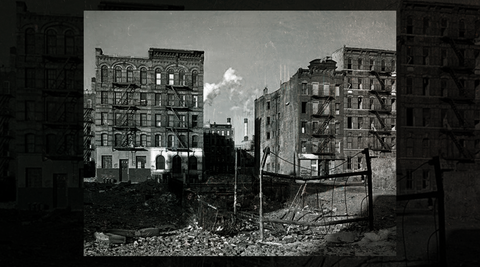The DIY ethos in New York Hardcore (NYHC) is more than just a philosophy; it's the heartbeat of the movement. This hands-on, self-reliant approach has been central to NYHC since its inception, shaping not only the music but also the culture, community, and identity of the scene.
1. Grassroots Beginnings:
-
DIY Shows and Venues:
- In the early days of NYHC, traditional venues were often reluctant to host hardcore shows. In response, the community embraced the DIY spirit by organizing shows in unconventional spaces. Basements, community centers, and even abandoned buildings became impromptu venues, fostering an intimate and inclusive environment.
-
Fan-Driven Activism:
- Fans took the initiative to organize and promote shows, often bypassing traditional promoters. This grassroots approach allowed for a more direct connection between bands and their audience, creating a sense of shared ownership within the community.
2. Independent Music Production:
-
Self-Produced Records:
- Many NYHC bands took matters into their own hands by self-producing and releasing their records. This not only allowed for creative control but also provided a platform for bands to share their music independently, free from major label influence.
-
Local Record Labels:
- Independent, local record labels played a crucial role in the distribution of NYHC music. Labels such as Revelation Records and Victory Records emerged to support the scene, releasing iconic albums and helping to establish a network for DIY distribution.
3. DIY Media and Communication:
-
Fanzines and DIY Publications:
- The creation of fanzines and DIY publications became a vital means of communication within the NYHC scene. Enthusiasts and musicians alike produced these publications to share news, interviews, reviews, and artwork. The DIY approach ensured that information circulated organically within the community.
-
Handmade Flyers and Artwork:
- Flyer and poster design was often a collaborative effort, with hand-drawn or photocopied flyers becoming iconic symbols of the NYHC aesthetic. DIY artwork not only promoted shows but also became an integral part of the scene's visual identity.
4. Merchandise and Self-Promotion:
-
DIY Band Merchandise:
- NYHC bands embraced the DIY ethic when it came to merchandise. T-shirts, patches, stickers, and other merchandise were often created by the bands themselves, showcasing their distinctive logos and artwork. This approach allowed bands to maintain a direct connection with their fanbase.
-
Self-Booking and Promotion:
- Bands actively participated in booking their shows and promoting their music. The DIY approach to self-promotion empowered bands to control their own destinies, build local followings, and forge connections within the broader hardcore community.
5. Inclusivity and Unity:
-
DIY Shows and All-Ages Venues:
- DIY shows often embraced an all-ages policy, breaking down barriers and fostering a more inclusive environment. This approach not only welcomed younger fans into the scene but also emphasized the importance of unity and accessibility.
-
Community Engagement and Activism:
- The DIY ethos in NYHC extended beyond music to include community engagement and activism. Bands used their platforms to address social issues, promoting positive change within the scene and beyond.
The DIY ethos in NYHC isn't just a method; it's a philosophy that embodies the scene's resilience, creativity, and community spirit. By embracing the DIY approach, NYHC bands and enthusiasts have forged a unique subculture that remains true to its roots. The legacy of DIY ethics in NYHC lives on in the continued independence, passion, and authenticity of the movement, ensuring that the scene remains a vibrant force in punk and hardcore music.

